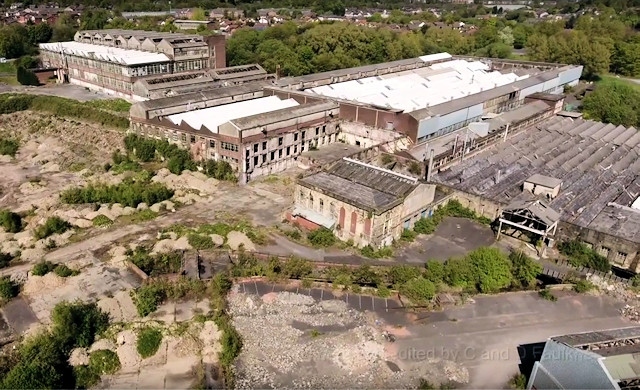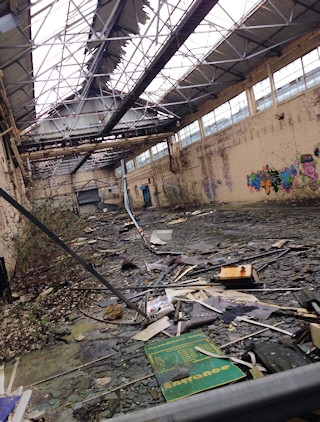Westminster launch of Spodden Valley Trust educational and research body
Date published: 04 February 2020

Spodden Valley campaigner Jason Addy at Westminster
An educational and research body dedicated to archiving documents related to asbestos, environmental and occupational disease named The Spodden Valley Trust has been launched at the Houses of Parliament.
An archive is being collated, including many documents relating to the asbestos industry both in the UK and overseas, together with other sources of information regarding occupational and environmental disease and community campaigning.
This will include the documents relating to the Save Spodden Valley campaign, which began in 2004 when a planning application was lodged to build over 600 homes and a children's nursery on the site of the former Turner Brothers Asbestos factory, once the world’s largest asbestos plant.
The factory processed asbestos from the 1870s until the mid-1990s before going into administration in 2001.
Spodden Valley campaigner Jason Addy spoke at Westminster, to discuss some of the trust's projects: "One of the key priorities is to provide factual information for the research into low level, yet significant, exposure to asbestos.
“The issue of occupational and environmental disease in relation to cancer is an important issue with significant consequences for medical, legal and policy decisions.”
The Spodden Valley Trust will work with a number of national and international organisations, charities and universities on academic and educational issues.
The Spodden Valley has a bitter-sweet resonance for those who know the area. Situated on the urban fringe of Rochdale on the edge of the Greater Manchester conurbation, the former asbestos factory site borders the picturesque woodland of the Healey Dell Nature Reserve and the dramatic landscapes of the East Pennine Moors.

© Carl Faulkner
The former Turner Brothers Asbestos (TBA) factory, once over 100 acres in size, employed many generations of workers. In-house company magazines printed stories of workers enjoying happy social events in the many clubs and societies organised within the factory. Unfortunately, there was a sinister side to the site because of the material that was processed – asbestos.
Company documents suggest that many of the dangers to health from the ‘magic mineral’ were not disclosed to shop floor workers and local residents.
With the legacy of the site having such an impact on people’s lives, hundreds of local residents concerned about asbestos contamination and damage to wildlife habitat formed the vocal Save Spodden Valley campaign in 2004.
For over 15 years Save Spodden Valley has been campaigning for open and accountable scrutiny of the history and legacy of the former asbestos site to ensure a permanent and safe solution for the people of Rochdale.
In 2005, it was confirmed that asbestos factory waste was exposed on the site beside the river Spodden. Tests were conducted that confirmed that all types of commercially produced asbestos – amosite, crocidolite and chrysotile were present in the samples tested.

The area was ‘turfed’ over but in the years since, the Save Spodden Valley campaign and national charities have expressed concern about the growing danger of asbestos exposure and damage to the crumbling retaining walls beside the riverbank.
These fears were realised in late 2018 when the banking collapsed:
Soil tests on the TBA site in 2013 confirmed asbestos contamination in most of the test holes dug and United Utilities asbestos air testing detected elevated levels of asbestos fibres in the air.
A geophysical ground survey was carried out between November 2016 and March 2017, with the findings still yet to be published. Despite the landowner’s representatives stating they intend to share the report with the council, the council has not been provided with the report nor a timeframe.
A £26,000 council-commissioned air survey in October 2017 identified the discovery of a single asbestos fibre containing amphibole (‘brown’ or ‘blue’ asbestos) from a sample taken at Harridge Avenue.
According to Rochdale Borough Council, the landowner’s representatives have removed fly-tipped material from the public pathways and improved site security, but no further action has been taken by the landowners on other issued raised.
Read more
There are over 250 articles dating back to 2005 relating to the former asbestos factory site and the Save Spodden Valley campaign in the Rochdale Online news archives:
Do you have a story for us?
Let us know by emailing news@rochdaleonline.co.uk
All contact will be treated in confidence.
Most Viewed News Stories
- 1Newhey's Char Steakhouse and Bank Chamber close with immediate effect
- 2Six men arrested in Rochdale child exploitation investigation
- 3Royton haulage firm fined after Rochdale dad went to work and didn’t come home
- 4Two men arrested after police chase ends up in Middleton river
- 5Obituary: Jean Ashworth
To contact the Rochdale Online news desk, email news@rochdaleonline.co.uk or visit our news submission page.
To get the latest news on your desktop or mobile, follow Rochdale Online on Twitter and Facebook.


